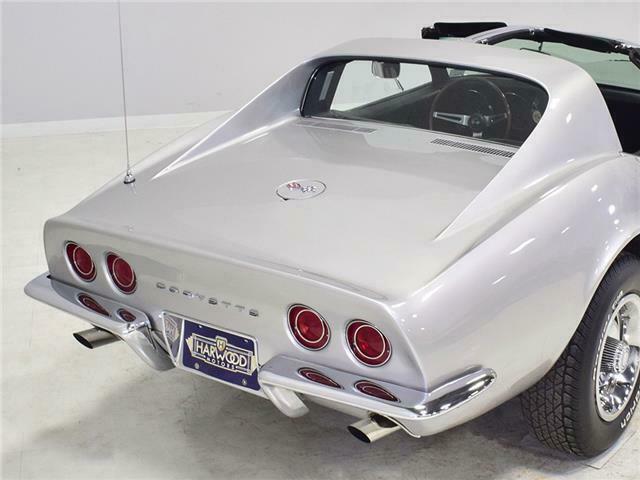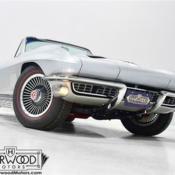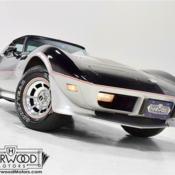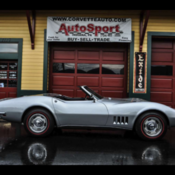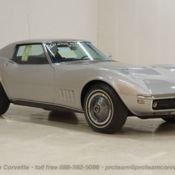1968 Chevrolet Corvette L89 48467 Miles Silverstone Silver 427 cubic inch L89
Technical specifications of Chevrolet Corvette L89 1968
| Price: | US $99,900.00 |
|---|---|
| Condition: | Used |
| Item location: | Local pick-up only |
| Make: | Chevrolet |
| Model: | Corvette L89 |
| Type: | -- |
| Trim: | -- |
| Year: | 1968 |
| Mileage: | 48467 |
| VIN: | 194378S416113 |
| Color: | Silver |
| Engine size: | 427 cubic inch L89 V8 |
| Power options: | -- |
| Fuel: | Gasoline |
| Transmission: | Manual |
| Drive type: | -- |
| Interior color: | Black |
| Options: | -- |
| Vehicle Title: | N/A |
| You are interested? | Contact the seller! |
Description
We’re not going to go into the history of Corvettes or GM performance while introducing this beautiful 1968 Chevrolet Corvette L89. The important things that you’ll want to know are these: it is a real-deal L89 with its aluminum heads still intact, tank sticker to prove that it’s legit, a warranty replacement CE-code block (almost all of these were raced and almost all of them blew up pretty fast, so that’s not unusual), 48,467 original miles, and a fantastic combination... of restored and original parts that make for a fantastic presentation. Silverstone Silver over a standard black interior is how it was delivered, and the interior is almost entirely original save for the carpets, backing up the low mileage claim. It has been recently and extensively serviced, runs superbly, and has no issues so it’s ready to drive and enjoy. This is a lot of Corvette for the money, the kind that gets everyone’s attention at even the biggest Corvette meets. The L89 is truly a special find. Only 624 buyers opted for the L89 aluminum cylinder heads, which shouldn’t be surprising: they added $805.75 to the cost of a new Corvette, which was nearly 20%. To get the L89 heads, you also had to pony up for the L71 427/435 engine, which was another $437.10, so it’s understandable that these were purchased by serious people with serious intent. The fact that this car also includes the transistorized ignition system, close-ratio 4-speed manual gearbox, F41 suspension, 4.10 gears, and off-road exhaust system all suggest that it was built for combat, not to be some guy’s street sweeper. Silverstone Silver was a surprisingly popular color for the all-new 1968 Stingray (now one word) and it’s easy to understand why when you see this very pretty coupe. It’s purposeful and no-nonsense, which is perfect for the L89 powerplant living inside, yet retains the kind of European elegance that Chevy designers were aiming for when they built it. This car was repainted a few years ago and still looks fantastic with very little use since it was completed. The two-stage urethane used today is far better than the original enamel, but it isn’t necessarily over-restored, either. Gaps are pretty much the way the factory did it and it retains all the unique 1968 features, including the door handles with pushbutton latches. Obviously the important stuff such as the ‘427’ emblems on the vented hood, the beautiful chrome bumpers, and the taillights with separate back-up lights are all correct and in fantastic shape. This car looks fantastic! The black standard interior strongly suggests that this Corvette has been loved all its life. Those are original seat covers and they’re in fantastic condition for being more than 50 years old. The carpets are simply too nice to be anything but new replacements, while the door panels, dash pad, and arm rest appear to be factory-issue. The gauges are all fully operational, as are the fiber-optic bulb indicators on the center console, one of GM’s better ideas that really adds to the cool factor inside this ‘Vette. It also carries its original Delco AM/FM radio with unique knobs and that big chrome shifter remains one of the very best ways to have fun in an old car. It’s also equipped with a telescoping steering column topped by a wood-rimmed wheel that warms up the otherwise all-black passenger compartment, and the lift-off T-top panels and removable rear window make this coupe feel as open as a convertible. New Corvette-logo floor mats were added to protect the carpets but otherwise this feels very much like it would have in the summer of ’68 when this car was first prowling the streets. The engine is a CE-coded warranty replacement 427 block (casting no. 3963512) that was probably installed in 1970 or so. CE blocks are desirable because they are factory-built and issued, and they did require corporate approval, meaning that it was a legitimate warranty claim honored by the factory. It’s topped with correct L89 aluminum heads and three Holley 2-barrel carbs. Chevy didn’t change the horsepower rating of the L71 with aluminum heads, but since they were playing games with the numbers anyway, it’s all academic. They do shave about 60 pounds from the nose and experts figure that the horsepower rating of an L89 in proper tune is about 480, which isn’t too shabby for 1968. The engine certainly feels like it could accelerate forever yet is perfectly content to trundle around town using only the center carb. It has also been recently detailed with correct Chevy Orange paint, reproduction tower hose clamps, proper decals, ignition shields, and more. Whenever possible, assembly markings were duplicated and again, it wasn’t over-restored so you still have natural cast iron on the exhaust manifolds and brake booster. The lone deviation from stock is the addition of an MSD ignition box discreetly tucked under the fender, replacing the original transistor ignition system. This one runs like it should. It still carries its original, numbers-matching Muncie M21 close-ratio 4-speed manual gearbox which feeds 4.11 gears on a Posi rear axle. Yeah, there’s no misunderstanding what this car is all about. It’s impossible to stall and around town it feels like a weapon that could slay any giant. It isn’t designed to travel cross-country, but you’ll quickly find a lot of opportunities to explore the limits of the rear tires’ traction. It’s just a blast to drive! The off-road “chambered” exhaust system sounds spectacular and someone has added a composite leaf spring in back to improve ride quality and shed some unsprung weight. You’ll note that all the lines and hoses are new, the brakes have been rebuilt and the important areas of the frame ahead of the rear wheels are in excellent condition. It sits on correct Rally wheels and right-sized 225/70/15 BFGoodrich T/A radials. The car includes its original tank sticker showing that this is a real L89. The early Stingrays have reputations for being crude, brutal beasts, but driving this spectacular L89 proves that when they’re right, they’re just a joy to own. This one has no bad habits, no fussy manners, and just loves to run through the gears. It’s the right car for someone who likes to drive rather than trailer his cars to shows, because it works like a real car and isn’t made of unobtainium. And when you tilt the hood forward and reveal that triangular air cleaner and aluminum heads, Corvette fans are going to notice. This is an extremely cool car with a good pedigree and a conscientious restoration. That’s what Corvettes are all about, right? Call today!











